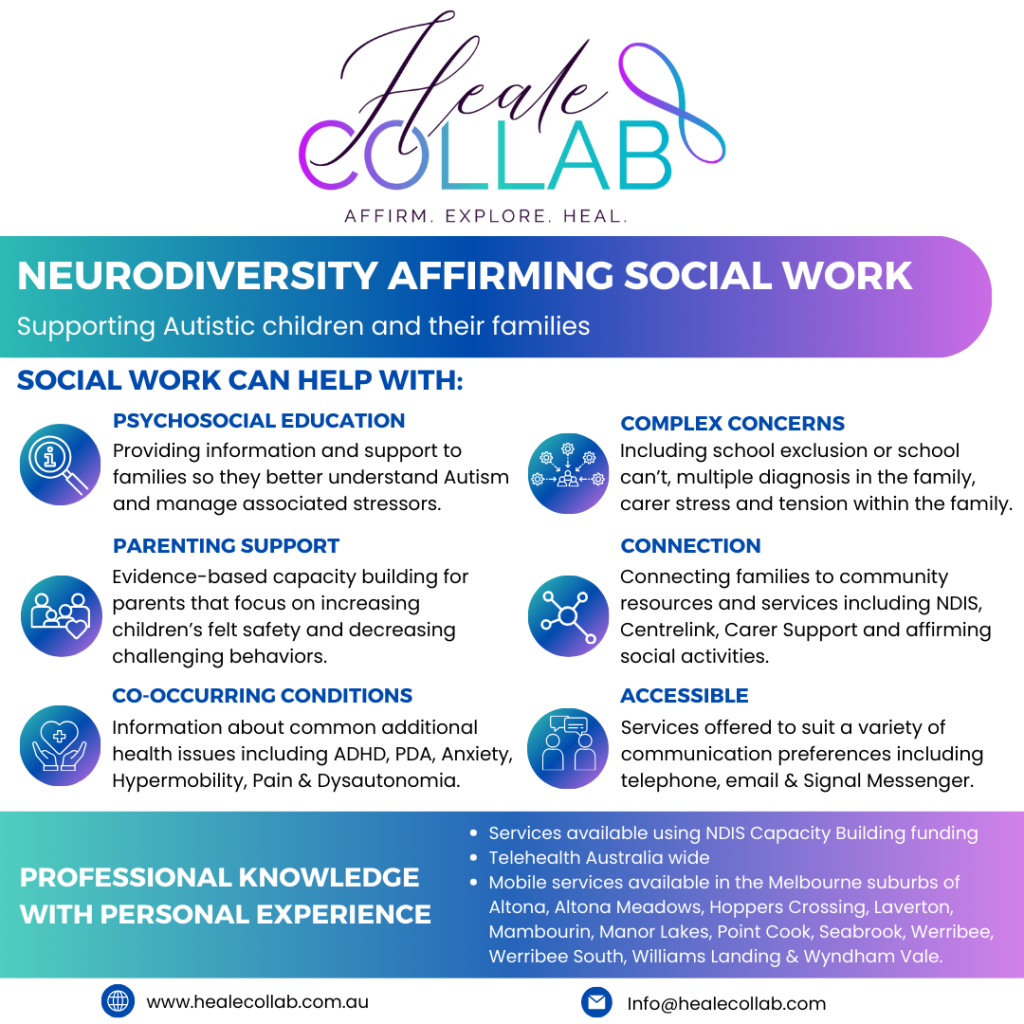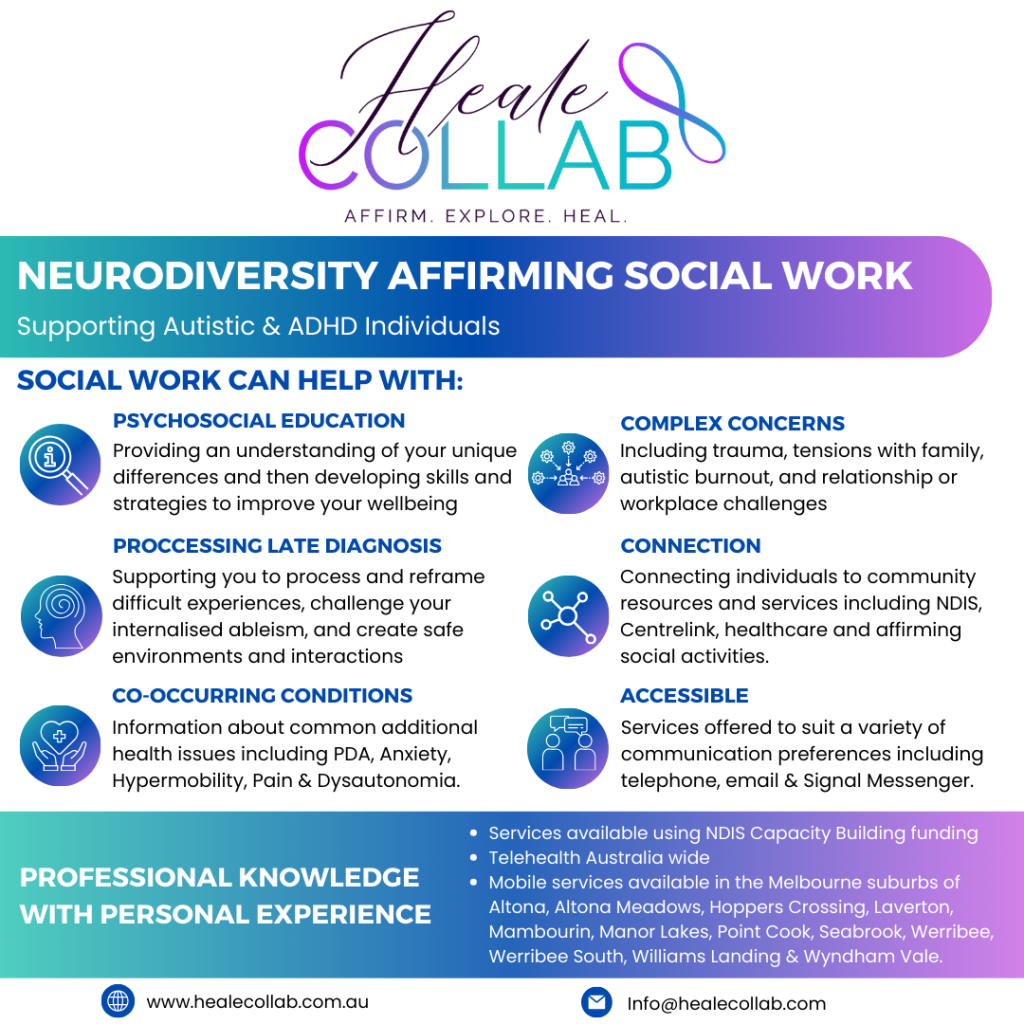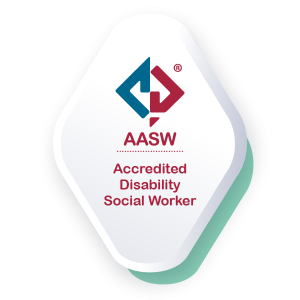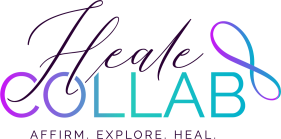About Heale Collab
Neurodiversity affirming social work sharing knowledge and working collaboratively with you
Guiding Principles
Affirm – to state something as true
We aim to always validate your experience of the world and the way you think, learn & communicate. We recognise that you are the expert in your life and that your current challenges and needs are a failing of the systems surrounding you. We accept, support and accommodate your needs when accessing our service.
Explore – to try to discover; learn about
We offer a safe space for you to learn about neurodiversity and how that is experienced by you and your family. Supporting you to understand and challenge current societal expectations around productivity, executive functioning, communication, socialisation and independence. We assist you to develop advocacy skills by helping you identify your needs and the needs of your family, support you to explore suitable environments, strategies and tools, as well as honouring your decisions.
Heal – to make or become healthy or whole again
We understand that many neurodivergent individuals and their families experience distress or trauma from a variety of sources including sensory sensitivities, bullying and gaslighting. We aim to help you heal from this trauma by supporting you to process and reframe difficult experiences, challenge internalised ableism, discover safe environments, and create space to recover from burnout.


Social Work @ Heale Collab
“Social work is a tertiary-qualified profession recognised nationally and internationally that supports individuals, families, groups and communities to improve their wellbeing. Principles of social justice, human rights, collective responsibility and respect for diversity are central to the profession and are underpinned by theories of social work, social sciences, humanities and Indigenous knowledge.” (AASW 2023).
Social Workers are allied health professionals who aim to enhance the quality of life of every member of society and empower them to develop their full potential. Social workers adopt a person-in-environment approach that includes a focus on the structural and cultural factors that may negatively impact on an individual’s abilities to engage with the social world. Social workers believe that all people, regardless of difference, have the right to be included in society and to have outcomes equal to other citizens.
Neurodiversity affirming practice seeks to collaborate with individuals to understand their unique differences and the impact their environment has on these. It aims to recognise all perceptions as valid, and support individuals and their carers to completely accept the varied aspects of being neurodivergent, both the advantages and disadvantages. Once these differences are understood and accepted skills, tools, and strategies can be developed to improve wellbeing. Recognising and accepting that people have different ways of thinking, feeling, processing information, and communicating will have positive effects across various aspects of life such as wellbeing, learning and engagement.
Neurodiversity affirming social work therapy works collaboratively with you to build capacity in the areas that are important to you. Therapeutic interventions offered include:
- Developing knowledge about the complexity of diagnosis and the changing impact across the lifespan
- Developing knowledge regarding the impact of external factors and build skills to navigate these
- Building neurodiversity affirming skills regarding self-advocacy, conflict management, self-regulation and more
- Educating parents and carers to build their own skills and confidence to support their child’s unique needs
- Supporting families to develop skills to manage competing sensory needs
Social Workers often support people through particularly difficult times in their life, when situations overcome your existing strategies. Some events where you may find a neurodiversity affirming social worker particularly helpful include:
- When a diagnosis is received
- Preparing for transitions (such as starting school or moving out of home)
- Sudden change in capacity or behaviour (such as finding it difficult to attend school)
- Changes in family dynamics or identification of neurodivergence in other family members
- Increasing overwhelm for carers
Who I am
My name is Leah & I am a proud AuDHDer (Autistic with ADHD). I am excited to offer my skills and knowledge as a neurodiversity affirming Accredited Disability Social Worker.
Over the past few years, I have focused on learning about Autism, PDA, ADHD, Complex Trauma, and all things Neurodiversity. I am happy to be part of a Neurodivergent community that validates the importance of self-acceptance and self-determination. Now that I better understand how my brain works, my experience of the world finally makes sense. This knowledge has allowed me to adapt my life to better support my needs.
I have worked as a social worker for over 15 years, primarily supporting clients living in the community with complex health needs. During this time, I became aware of the flaws in the medical model and its belief that difference is always a problem that needs to be ‘fixed’ by the professionals. I know there is a better way to understand and support people to maintain control of their care. By combining my professional experience, my lived experience, and the knowledge I have gathered by hyper-focusing on Neurodiversity, I am now uniquely positioned to collaborate with, and assist my Neurokin along with their support network.
Neurodiversity Affirming Professional Development
2024
Yellow Ladybugs Conference: Nurturing and Empowering Autistic Girls and Gender Diverse Students
Reframing Autism Community Summit
Creating Inclusive Homes For Autistic Children
Responding to Domestic & Family Violence in LGBTQ+ Communities
Accredited Disability Social Worker
2023
Collaborative & Proactive Solutions Advanced Course with Dr Ross Greene
Yellow Ladybugs Conference: Supporting Autistic Girls and Gender Diverse Youth at School and Beyond
ITAKOM: It takes all kinds of Minds Conference Online
Certificate of Autistic Wellbeing from Reframing Autism
Impact of Hormones Across the Lifespan in Neurodivergent Women Seminar
2022
Yellow Ladybugs Conference: ADHD and Autistic Minds
Victorian ADHD Conference
2021
Yellow Ladybugs Conference: Autistic Girls and Teens Mental Health and Safety
Submissions & Advocacy
2024
Submission to the National Disability Insurance Scheme Amendment (Getting the NDIS Back on Track No. 1) Bill 2024 [Provisions] inquiry
Participated in the Carer Consultation for the National Carer Strategy
2023
Submission to the Senate Education and Employment References Committee (the Committee) inquiry and report on ‘The national trend of school refusal and related matters’ is now available
Submission to the Legislative Council Legal and Social Issues Committee Inquiry into the state education system in Victoria
Provided feedback in the development of National Autism Strategy by attending an Autistic Voices Forum
2022
Submission to the Royal Commission into Violence, Abuse, Neglect and Exploitation of People with Disability


The person behind Heale Collab

Supports offered by Heale Collab
Acknowledgment of Country
Heale Collab acknowledges the Bunurong people of the Kulin Nation who are the Traditional Owners of the lands on which we work and learn. The Bunurong people always have and always will belong to the Werribee Yalook (river), stars, hills and red clay of this Country. We recognise their continued connection and role caring for Country over thousands of generations. We pay respect to their Elders past and present who continue to preserve and protect Country, culture and community.
